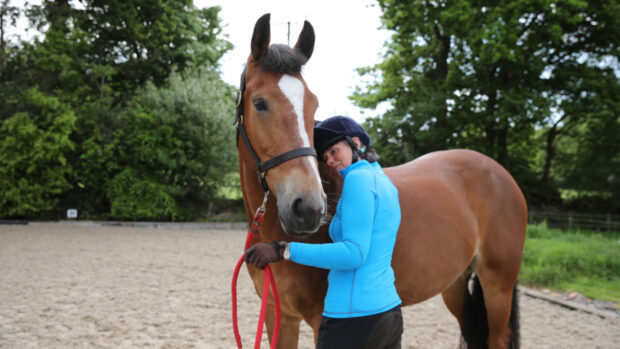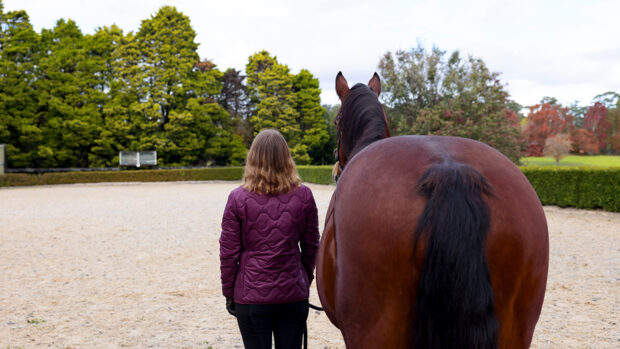Hi all, and welcome back!
Firstly, I am sorry for the radio silence. Adjusting to the ‘new normal’ of life during this pandemic has been weird and difficult. No longer do I have any shows to talk about or training to discuss. While I did stay riding throughout lockdown, it became a touchy subject for many of us who couldn’t, so to prevent further upset in the atmosphere I opted to stay quiet on the subject. However, I am now back with my writing cap on, so buckle up and get ready to read into my thoughts!
With the recent mental health awareness week, I have been keenly reading all things related to the subject, especially where riders are concerned. I loved the piece written by H&H on how and why riders are susceptible to mental health issues, especially Charlie Unwin’s points on social media. Having experienced this myself, what better time than now is there to share the views of a young professional in this tough industry, which becomes more digital by the day.
Social media can be amazing. We are all virtually connected, able to talk to friends across the planet, ask advice on anything from which vet wrap to buy to training tips on flying-changes. Every part of our lives can be documented for the world to see. But as the individual controllers of what content we choose to share, we can paint our lives out in whatever light we like. And this, I fear, is where the problem begins.
As Charlie Unwin put it, you can literally “create a twisted perception of reality.”
In years gone by, I admit to being guilty of this. Now that I write these blogs however, I have become more confident to tell complete strangers everything in my life, from the good to the ugly. I do though have a very legitimate fear of the dreaded online trolls, so I tear my own photos or videos to pieces before ever posting them. Few make the cut, not because I am doing anything wrong, but because I don’t have enough confidence to put anything that isn’t ‘perfect’ out there. This certainly isn’t good for my own mental health, as I become my own worst enemy. If my riding photos don’t look as good as those I see online, I don’t want to post them. Seeing posts of wonderful training sessions can inspire me, give me hints and make me ride better. But it can also fuel spite, jealousy and doubt, and I am sure I am not alone in feeling like this. Comparison really is the thief of joy.
I do feel like many, if not all of us of a younger generation are hiding behind the pretend life we all live online.
The same can be seen in the wider online world too. From the very orchestrated profiles of Love Island contestants to Hollywood super models, everything we see effects our mental health. I recently saw a post of a young girl asking when she would get a life like that of an Instagram influencer. A brilliant comment followed — “When are people going to realise that comparing your life to an Instagram influencer whose job it is to manipulate what you see online is both unhealthy and damaging?” And I couldn’t have put it better myself. That being said, the few equestrian influencers there are do a really good job of using their platform to be honest. But are the rest of us honest with what we post?
I asked two fellow young professional dressage riders for their input in this. I’m so glad I did, as I loved what they had to say. Firstly, I spoke to Amy Schiessl, whom I have shared many laughs with over the years.
Amy commented that: “We all try to make it seem that we are living our best lives. But in reality, horses are an incredibly hard industry and we all have major highs and even bigger lows, but we only talk about the highs. We should all try to boost each other up and talk more! It is very tough, and we are all in the same boat.”
Next, I asked my questions across the pond, to Spanish rider Rodrigo Encinas Fuentes who works and trains along the east coast of America.
He commented that: “Social media has become a way of self-promotion at all levels. The inborn necessity of humans to present ourselves as close to perfection as possible has created this unrealistic world. If in the advertising world you want to sell a product, why would you show all the inconveniences it has? We need to understand that the reality is far from perfect. If we don’t, we might fall into frustration due to the fact that we are not able to achieve the same thing we see others doing.”
I loved hearing this from these two, whose online profiles boast enviable success.
The main thing I got from talking to them is that communication is key and to take everything we see on social media with a pinch of salt.
Like this? You might also enjoy reading these:
Joanna Thurman-Baker’s dressage blog: here’s to sunny days, happy horses and an end to this madness
Subscribe to Horse & Hound magazine today – and enjoy unlimited website access all year round
I do feel like the online community needs to change. If we don’t, future generations will grow up trapped in an idealistic lifestyle, which will lead to depression, isolation and anxiety. We need less false pretenses, more real life. Less online trolls, more online supporters. More enjoying horses for being horses, less need for the perfect Instagram photo. It is now in our hands to change it. Let’s be that change.
Joanna
We continue to publish Horse & Hound magazine weekly during the coronavirus pandemic, as well as keeping horseandhound.co.uk up to date with all the breaking news, features and more. Click here for info about magazine subscriptions (six issues for £6) and access to our premium H&H Plus content online.




